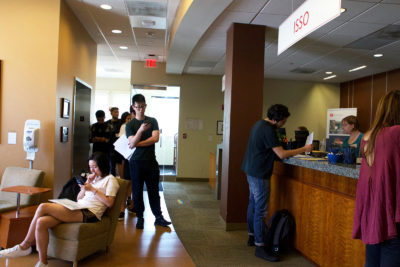
International students are increasingly choosing to attend Canadian universities over universities in the United States — a trend BU is working to combat.
Home to roughly 1 million foreign students, the United States remains the No. 1 choice for international college applications — but the 2016 election and ensuing rise of a turbulent political climate are starting to repel students who may otherwise attend American colleges, according to an article published by The Boston Globe.
Sarah Sherman-Stokes, the associate director of the BU Immigrants’ Rights and Human Trafficking Clinic, said BU has taken a decided stance on this issue.
“[BU] has a tradition in inclusiveness, and it’s part of who we are as a university,” Sherman-Stokes said. “There certainly has been quite a bit of vocal support for immigrant students over the last few months in the wake of very anti-immigrant policies put forth by the Trump administration.”
Sherman-Stokes cited BU President Robert Brown’s public opposition to President Donald Trump’s decision to rescind the Deferred Action for Childhood Arrivals program as one way the university has shown its support for its international community.
This issue is particularly relevant to BU because the university’s international student population hovers above 20 percent, according to BU spokesperson Colin Riley. The Class of 2021 is made up of 22 percent international students — a percentage that fluctuates slightly year-to-year, he wrote in an email.
William Keylor, a professor in BU’s Frederick S. Pardee School of Global Studies, said Trump’s rhetoric — that emphasizes prioritizing American interests — might dissuade international students from studying in the United States.
“There probably was a reaction on the part of a number of international students after … the election of Donald Trump as president,” Keylor said. “I think that many of them feared that he was pursuing this policy of ‘America First,’ and that seemed to suggest that the rest of the world is not as important to the United States as it had been considered in earlier administrations.”
Keylor said U.S. universities can play a role in mitigating the concerns of international students by promoting the cause of immigration and urging Congress to take action.
“Universities can play an important role, I think, in educating people about the value of immigration and the fact that immigrants made this country and continue to contribute heavily to this country,” Keylor said. “That would sort of contradict the slogan, if you will, of ‘America First’ and ‘Make America Great Again.’”
Political science professor Virginia Sapiro said she thinks if the Trump administration continues to push anti-immigration policies, it may be difficult in the future to revive interest from discouraged prospective international students.
“People who will have begun education elsewhere will continue, the other [colleges] will develop their facilities and their support for international students, so it’s not like a tap you can just turn on and off,” Sapiro said. “If we lose significant prestige or recognition among the world body of students who want to go to great universities, we’ll have to work very hard to get that back.”
Several international students at BU said due to the political climate in the United States, they hesitated to enroll in college here or knew people who chose to attend colleges in other less politically agitated countries.
Gaurav Bagur, a College of Communication freshman from India, said several of his friends opted for Canadian colleges.
“I know a lot of people who would have felt very uncomfortable had they chosen to come here and that’s why they chose to go to [college in] Canada instead,” he said.
Anjali Vallikkat, another COM freshman from the United Arab Emirates, said she thinks BU’s diversity is an attractive quality for international students.
“Since BU’s atmosphere is very diverse, a lot of international students like coming here because it’s different, it’s liberal, you get the kind of freedom that most other countries don’t give you academically or otherwise,” Vallikkat said.
She added that if the UAE had been included on the list of Muslim-majority countries banned from travel to the United States, she would have turned to universities in other countries.
“If I was someone who was on the list of countries that he was opposing, I think I definitely would’ve applied to maybe Canada or England,” Vallikkat said. “I wouldn’t want to be here and then find out his policies are going further and it’s going to affect me and my family.”
Ritika Jain, a Questrom School of Business freshman from India, said although the political climate in the United States makes her feel unsafe, the degree of tolerance and acceptance in the city of Boston persuaded her to attend BU.
“As an international student, I definitely felt unsafe after hearing what was going on in the United States,” Jain said. “Even though I did get offers from other parts of the country, I took Boston’s just solely because of its political and accepting climate.”
Jain also said several of her classmates in high school did not even consider applying to U.S. colleges.
“When my classmates and I and our families were sitting down and talking about it, half of them were hesitant to even think about the U.S. and the other half were totally against it and applied to Canada, the United Kingdom, and other countries, so it is definitely scary,” Jain said.
CORRECTION: A previous version of this article stated: “William Keylor, a professor in BU’s Frederick S. Pardee School of Global Studies, said Trump’s rhetoric emphasizes prioritizing American interests might dissuade international students from studying in the United States.” This sentence has been updated for clarity.
Jennifer Small is a junior in the Boston University College of Communication, majoring in journalism and minoring in media science. She is one of the Co-Campus News Editors for Spring 2023.

